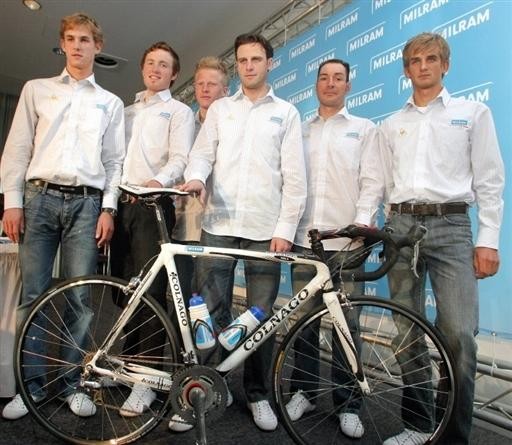Milram's new identity
As Team Milram shifts its nationality from Italian to German, the team's leaders naturally had to...

Erik Zabel hints at retirement at team's launch
As Team Milram shifts its nationality from Italian to German, the team's leaders naturally had to answer plenty of questions about its anti-doping program from the audience in Bremen, Germany at its team presentation on Thursday. Also hot topics were the shift in its country affiliation and the condition of its top sprinters, Erik Zabel and Alessandro Petacchi. Cyclingnews' Susan Westemeyer reports from the launch.
The Milram team, like most of the cycling world, suffered under the weight of doping allegations, confessions and suspicions in 2007, but with a change in team management, it hopes to assure its fans and sponsors that the team is "new" for 2008.
In May last year, it's team captain Erik Zabel confessed to having used EPO in the 1990s. Then its other sprinter Alessandro Petacchi came up 'non-negative' for a too-high level of asthma medications in his urine during the Giro d'Italia, and fought off attempts by the Italian Olympic Committee (CONI) to sanction him.
More seriously, the team's general manager, Gianluigi Stanga had allegations leveled against him by German Jörg Jaksche, blaming Stanga for introducing him to doping on Team Polti in the 1990s. Stanga denied the charges, but the damage was done, and he had no choice but to step aside and be replaced by Dutch man Gerry Van Gerwen.
Martin Mischel, sales and marketing director of the team's title sponsor, Nordmilch AG, refused to blame Stanga, but indicated that the incident influenced the decision to move the team to Germany. "The things that were published last year concerning Stanga reflected on the team, which led to discussions. An agreement was reached between Gerry Van Gerwen and Stanga, to which we also agreed, to take over the team. The most important thing was to have the team based in Germany."
The team introduced the now practically obligatory anti-doping programme, which is based on five pillars: official rules; additional voluntary agreements; increased prevention; increased transparency; and clear consequences. "When a rider makes a mistake and is suspended for two years, that is not the end of it. Then comes the two-year ProTour ban, which makes a total of four years. He must pay back a year's salary. He has to answer to his wife and children - those are the consequences the riders must take into consideration," said General Manager Gerry Van Gerwen.
Get The Leadout Newsletter
The latest race content, interviews, features, reviews and expert buying guides, direct to your inbox!
The practical consequences that the team can hand out are blunt: "An immediate suspension in case of a doping suspicion and an immediate dismissal in case of a confirmed doping case," Van Gerwen explained.

Laura Weislo has been with Cyclingnews since 2006 after making a switch from a career in science. As Managing Editor, she coordinates coverage for North American events and global news. As former elite-level road racer who dabbled in cyclo-cross and track, Laura has a passion for all three disciplines. When not working she likes to go camping and explore lesser traveled roads, paths and gravel tracks. Laura specialises in covering doping, anti-doping, UCI governance and performing data analysis.